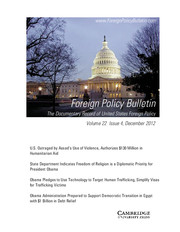Editorial Comments
EDITOR'S NOTE
There have been several pivotal moments in foreign affairs in recent years — the end of China's isolation and it's opening to foreign investment and trade; the end of the Cold War and the collapse of communism in Eastern Europe, and the U.S. invasions of Afghanistan and Iraq. We hope that another pivotal moment will arise from President Obama's address to the Muslim world in Cairo, covered in this issue. Relations between the United States and the broader Muslim world — 1 billion strong and growing rapidly, from Nigeria to Indonesia — may determine whether the future holds peace or more terrorism, debilitating conflicts over oil-rich lands and their transit routes or development and prosperity, and global integration or continued regional crises. President Obama is uniquely placed, as a person of color with backgrounds in Africa and Indonesia, to change the view of the United States throughout the developing world. Yet the legacies of imperialism and Cold War proxy support for Third World dictators remain strong. Perhaps this Presidency, however, the U.S. can begin to turn the page on the past and move forward.
Another legacy of the Cold War — nuclear weapons proliferation — has also moved to center stage, with North Korean missile tests and Iran's continued uranium enrichment posing challenges to the Cold War's non-proliferation regime. Meanwhile, strategy is being reformulated to deal with the Taliban insurgency in Afghanistan, and spill over effects in Pakistan. While we hope for a promising new beginning, the United States clearly has an array of complex foreign policy challenges ahead.
Also, with this issue we have a changing of the guard at Foreign Policy Bulletin. We bid adieu to Kevin Fandl, who has served brilliantly as our managing editor, giving FPB a new look and keeping it abreast of the latest events. We welcome Callie Le Renard, also of George Mason University, who is taking over as our new managing editor. We look forward to continuing to provide the clearest and most accessible source of U.S. Foreign Policy documents under her skilled editorial hands.
Jack A. Goldstone, Editor
jgoldstone@gmu.edu
Callie Le Renard, Managing Editor
clerenar@gmu.edu
MISSION STATEMENT
The Foreign Policy Bulletin is a reference periodical published quarterly by Cambridge University Press. Its purpose is to make available a timely and systematic record of United States foreign policy.
In addition to major addresses, statements, and other public reports and remarks of the President, Secretary of State, and Administration officials in other foreign affairs agencies, the Foreign Policy Bulletin includes excerpts from pivotal debates in the Congress; speeches and other statements by foreign and international officials; relevant texts and reports from international organizations; summaries and listings of treaties and other agreements to which the United States is a party; and other information of particular interest to the study of U.S. foreign relations.
The Foreign Policy Bulletin is not affiliated with any government or international institution, and has complete editorial autonomy.
Each issue has a name and subject index as well as a list of documents. There is an annual index at the end of each volume.
INDEXING: Included in the PAIS (Public Affairs Information Service) indexes: the PAIS Bulletin, PAIS on CD-Rom, and online through Dialog, BRS, and Data Star.




